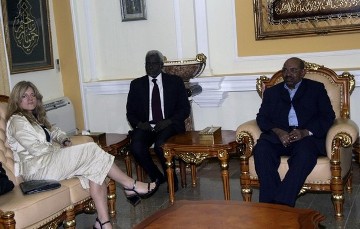UPDATE: UN top official in South Sudan meets with Bashir to discuss deescalating tensions
(Updates with reaction from UNMISS to what was reported on state media)
February 29, 2012 (KHARTOUM) – The Sudanese president Omer Hassan al-Bashir on Wednesday met with the Special Representative of the United Nations Secretary-General to South Sudan Hilde Johnson for talks on ways to improve relations between Khartoum and Juba.

Johnson who heads the UN Mission in South Sudan (UNMISS), did not put forward any proposals but brought up ideas she thought will help reduce tensions, according to the sources.
She told reporters after the meeting that she had “fruitful” talks with Bashir on her mandate which includes the improvement of bilateral relations between the two countries.
The UNMISS chief added that she tackled the difficulties faced by southerners in their return to South Sudan peacefully and securely and how to facilitate it as well as promoting trade relations between Sudan and South Sudan.
In a separate meeting with Sudanese foreign ministry undersecretary Rahmatallah Mohamed Osman, Johnson expressed fear that the two countries could go back to war.
But UNMISS spokesperson Kouider Zerrouk said in an emailed statement to Sudan Tribune that statements attributed to Johnson were inaccurate.
“The SRSG has repeatedly stated that Both parties have been through these kinds of crises before and have always overcome them. I have every reason to believe that they will do so this time around. Both parties have stated their intention for peace and neither side has given any indication otherwise”, Zerrouk said.
He further added that bilateral relations between the two countries are not part of Johnson’s mandate “but it is under the Special Envoy to Sudan and South Sudan mandate, Mr Haile Menkerios”.
Osman on his end said he is confident the two countries will be able to overcome the causes of the current tensions and that the relations will soon become normal, pointing out the urgent need to stop hostilities and rebuild confidence.
He added that the most important confidence-building step required is the strict implementation of the non-aggression pact signed this month, and severing the ties of South Sudan with northern rebel groups.
The Sudanese official said that it is important to demarcate what is agreed on with
regards to the borders so that crossings between the two countries can be identified and then it becomes possible to implement the trade protocol.
Sudan is locked in a row with South Sudan over sharing oil revenues. South Sudan, home to substantial crude reserves, split away as an independent country in July, under a 2005 peace agreement.
The landlocked South still needs to export its crude through the north’s port and pipelines. But the two countries went their separate ways without agreeing how much South Sudan was going to pay Sudan to use its oil infrastructure.
The crisis came to a head when Khartoum said in January it had seized some southern oil as compensation for what it called unpaid fees, and South Sudan responded by shutting down oil production.
Sudan is also furious over what it claims is Juba’s support to rebels who have recently intensified their attacks against the army particularly in South Kordofan.
Last weekend rebels claimed to have defeated Sudanese army in Jau town and Toroge. The army denied the reports.
(ST)
